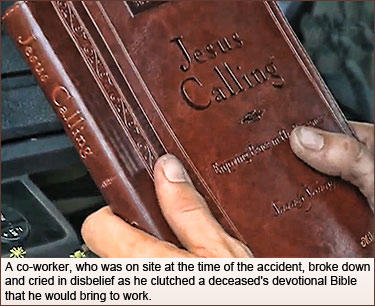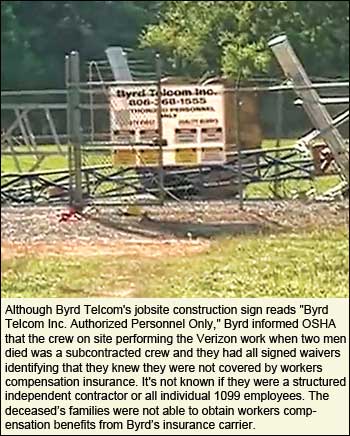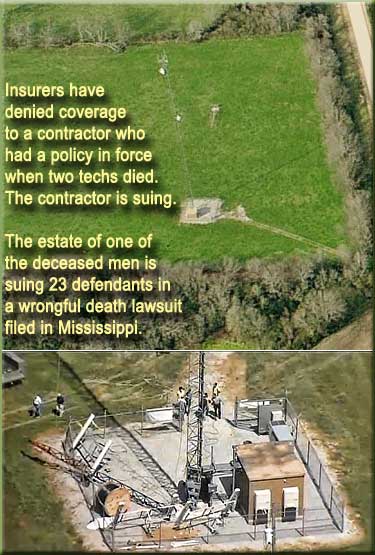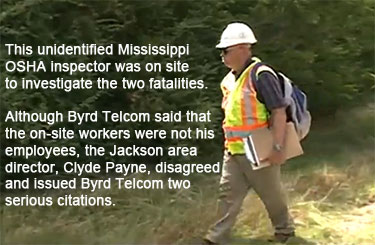Fraud charge, contractor status dispute and lawsuits trail the passing of two techs
December 19, 2013 – Stating that a tower erector fraudulently represented the scope of work it was performing on a Verizon LTE 4G upgrade and other projects, insurance carriers have denied workers compensation and indemnity coverage to a Texas contractor, although they acknowledge that there was a policy in force when two men were killed in Mississippi. The managing contractor says that they were independent contractors. As a result, the families of the deceased might have no one to turn to for assistance other than seeking a settlement from a protracted lawsuit that could take years. The managing contractor says that they were independent contractors. As a result, the families of the deceased might have no one to turn to for assistance other than seeking a settlement from a protracted lawsuit that could take years.
On May 28, 2013, Michael A. Castelli, 42, of Baton Rouge, La. and Johnny D. Martone, Jr., 32, of Taylorsville, Miss., were on a 300-foot tower in Georgetown, Miss., performing work for Byrd Telcom on a Verizon project when a gin pole broke from its rigging, striking them and causing the technicians to fall to the base of the structure where they were pronounced dead.
According to a lawsuit filed in July in U.S. District Court of the Northern District of Texas by Byrd Telcom and an associated company also owned by Lloyd Byrd, Circle B Electric and Tower, the plaintiffs said they notified Hartford Insurance of the Midwest and a subsidiary of the Hartford Financial Services Group, Sentinel Insurance Company, about the accident, but they were unresponsive.
Insurers refuse to honor active policy
Following the workers’ deaths, listed in the complaint incorrectly as occurring in 2012, the plaintiffs said the families of the deceased made claims against their companies and they requested that their insurers provide them with coverage, defense, and indemnity, but the defendants did not respond to their requests although the contractors state that their policies were in full force and effect and the premiums had been paid.
T he complaint states that following the fatalities the insurance carriers canceled the policies. he complaint states that following the fatalities the insurance carriers canceled the policies.
An attorney for the defendants, George Lankford of Dallas Tex. law firm Martin, Disiere, Jefferson & Wisdom, LLP, emailed Wireless Estimator on Dec. 12, 2013, confirming the cancellations were made following the deaths.
Though, as stated in the defendants’ reply to the original petition, they claim they had just cause.
The insurers said that they had properly cancelled the policies and coverage “because of material fraudulent representations by the plaintiffs.”
They said they issued the policies of general liability and workers compensation, and subsequently renewed them based on the plaintiffs’ representations that their operations were “normal electrical work within buildings”.
According to the insurers, the plaintiffs said they “had one fulltime employee in the State of Texas and no part time employees, that no work was performed by subcontractors, and no work was performed over ten feet in height.”
The defendants said that these were material representations to the risks that they relied upon in electing to issue and renew their policies of insurance.
“At no time during the initial application or any other renewal did the Plaintiffs indicate a material change in operations or change in these representations,” the defendants said in their court filing.
They said that the misrepresentations materially altered the risks, and they would not have issued or renewed the policies as underwritten had they been known.
Deceased’s employment status is in dispute
The defendants’ reference to Byrd Telcom employing subcontractors might have been presented since at issue is whether or not the deceased were employees or 1099 independent contractors.
THE DARDEN FACTORS
Employee or the Independent Contractor?
The common law agency test
1. The hiring party's right to control the manner and means by which the product is accomplished.
2. The skill required.
3. The source of the instrumentalities and tools.
4. The location of the work.
5. The duration of the relationship between the parties.
6. Whether the hiring party has the right to assign
additional projects to the hired party.
7. The extent of the hired party's discretion over when and how long to work.
8. The method of payment.
9. The hired party's role in hiring and paying assistants.
10. Whether the work is part of the regular business of the hiring party.
11. Whether the hiring party is in business.
12. The provision of employee benefits.
13. The tax treatment of the hired party. |
According to reliable sources, Byrd Telcom had informed OSHA that they should not receive two serious citations because the two men who died were subcontractors and they were not accountable for their actions.Because OSHA cited Byrd Telcom it is expected that they would have investigated to ensure that the deceased were under their direct employment as identified by payroll records, or at a minimum, under the control of Byrd Telcom due to jobsite supervision.
OSHA oftentimes will use the Darden Test to assess whether a worker is an independent contractor. The U.S. Supreme Court set forth a non-exhaustive list of 13 items to consider.
Wireless Estimator has identified that Byrd Telcom had hired five technicians with industry experience and certifications to construct the entire Verizon project for a fixed price.
Each individual had reportedly signed a statement that they were an independent contractor and as such acknowledged that they were not covered by workers compensation.
Those documents might strengthen Byrd’s assertion when applying the common law agency test to show that they were not employees.
Gin pole said to be leased by Byrd to an independent contractor
One of the factors that would identify that they were employees is if Byrd provided the  gin pole and winch that were used in the LTE upgrade project. gin pole and winch that were used in the LTE upgrade project.
However, Lloyd Byrd, who informed Wireless Estimator that he would not discuss the lawsuits and OSHA citations, reportedly leased his winch and gin pole to one of the independent contractors who supposedly was not on site when the fatalities occurred.
It is unknown which crew member of the five workers was in charge, although it would appear that the tower tech who leased the equipment would want to ensure the project’s success.
According to IRS regulations, the lease for equipment cannot be for a nominal amount or able to be canceled by the hiring firm at will.
OSHA Jackson Area Director Clyde Payne said he could not comment upon the investigation, but information would be available once the contested citations against Byrd Telcom totaling $14,000 are administrated.
The workers provided their own PPE, but in one of the OSHA citations issued to Byrd Telcom following the fatalities, Payne said that fall protection equipment used by the employees was not inspected and showed signs of deterioration and fraying on the climbing harness and lanyards.
It is also not known whether any of the five crew members had a business license to provide the installation services or the requisite insurance that is typically a pass down requirement from the carrier to the general contractor and all subcontractors.
Company may not have had to register in Mississippi
A search of the Mississippi Secretary of State business database neither shows Byrd Telcom nor Circle B Electric and Tower being registered in the State.
 A representative of the State Board of Contractors said that Byrd Telcom, which is not registered with them, as a subcontractor would have to do so if the project amount was over $50,000. If the firm was required to pull a building permit, however, she said they would have to be registered. A representative of the State Board of Contractors said that Byrd Telcom, which is not registered with them, as a subcontractor would have to do so if the project amount was over $50,000. If the firm was required to pull a building permit, however, she said they would have to be registered.
The Mississippi Workers Compensation Act requires coverage if an employer “has in service five or more workmen or operatives regularly in the same business or establishment under any contract of hire, express or implied.”
Verizon and other carriers require that all of their contractors must have statutory workers compensation coverage and between $2 and $3 million in general liability coverage.
Uninsured, oftentimes unqualified floating crews and workers are used in the industry and can be found seeking work on social media.
"They're out there and it's clearly illegal," said one Midwest tower company owner. "They think that because they might be making $40 an hour they'll always be on easy street until something like this happens or the IRS catches up with them."
Byrd Telcom, Inc. states in its lawsuit that its principal place of business is in Lubbock County, Tex., but provided OSHA with a Destin, Fla. address for mail service. The company is a Nevada corporation formed on Nov. 7, 2012.
First civil lawsuit names Verizon, suppliers, employees and others
The Martone estate filed a wrongful death lawsuit on November 27, 2013 against Verizon and a number of other businesses and suppliers. They’re also suing three employees individually due their supervisory role within their company.
Some of the damages they are seeking recovery for would have been paid for by Byrd Telcom’s workers compensation policy if Martone was an employee.
"Hartford is likely still on the hook," said an insurance executive who markets the industry. "It appears that they would be responsible for the workers comp since Byrd knowingly hired uninsured subs, but time and the courts will tell."
Of the numerous defendants listed, attorney Rocky Wilkins of Jackson, Miss., who filed the 42-page complaint, did not list Hartford Insurance of the Midwest or Sentinel Insurance Company, Byrd Telcom’s insurers.
The estate of Michael A. Castelli has hired Baton Rouge, La. attorney Bryan Fisher of Fisher Injury Lawyers. Fisher told Wireless Estimator that he expects to file a lawsuit next month.
The Martone complaint states that the injuries and death of Martone was the result of “the defendants' willful and/or negligent management, supervision, hiring, training, and supply of the defective products and equipment used during the installation of Verizon’s 4G LTE antennas.”
Labeling it a civil conspiracy, the lawsuit stated that “the Defendants, led by Verizon, negligently, recklessly, intentionally, willfully, and or knowingly engaged in a scheme to avoid liability for injuries to cell phone tower workers such as Johnny Martone and others.”
Defendants and their accountability, according to the lawsuit, include:
SWM Tower Sites, Inc.:
Managed and maintained controlled access to the tower site
Robert C. Latham:
Owner and incorporator of SWM Tower Sites, Inc.
Karen C. Partridge:
Owner and incorporator of SWM Tower Sites, Inc.
Louie Von Lowery:
Owner of the property on which the tower is located
Jerry Knight:
Owner of the property on which the tower is located
Commercial Intertech:
Manufacturer of hydraulic motor gear
Sabre Communications Corp:
Manufacturer of tower and supplier of gin pole
The Crosby Group, LLC:
Manufacturer of snatch block and shackle
PACCAR, Inc.:
Manufacturer of winch
SBA Communications, Inc.:
Owner of the tower
Harrison County, Miss. resident S.W:
Marketing manager of SBA Communications, Inc.
Clarke County, Miss. resident J.Y:
Regional site manager of SBA Communications, Inc.
Byrd Telcom, Inc.:
Employer of the deceased
Circle B Electric Lighting, Inc.:
Company associated through ownership with Byrd Telcom, Inc.
Lloyd “Sonny” Byrd: Manager,
President and/or CEO of Byrd Telcom and Circle B
Ravan Rochelle Ray Byrd:
Manager, president and/or CEO of Byrd Telcom and Circle B
Stone County Ark. resident:
Supervisor and/or manager at Byrd Telcom and Circle B
Verizon, Inc.:
Carrier whose antennas and lines were being installed by Byrd Telcom
Randy Dawayne Davidson:
Identified as the winch operator employed by Verizon as a supervisor and/or property manager
Capital Safety, USA:
Manufacturer of personal fall protection equipment
CommScope, Inc./DBA Andrew Systems:
Manufacturer of products used for the installation of Verizon radio equipment
Monroe Custom Utility Bodies:
Designed and installed the truck body that contained the winch
PenSafe:
Supplier of carabiners
A Verizon manager, not charged in the complaint, informed Wireless Estimator that Davidson was not an employee of Verizon. He stated he believed Davidson was the winch operator of the subcontracted crew and might not have been on site when the accident occurred.
The plaintiffs' attorneys might also be unsure of Davidson's employer at the time of their filing. In the complaint they said that Davidson was being sued individually for his negligence commited "...in the course and scope of his employment with Verizon (or any other Defendant employing Defendant Randy Davidson)...".
The lawsuit was filed in the Circuit Court of Copiah County, Miss., the county in which the Georgetown accident occurred. The plaintiffs are asking for a jury trial.
It is expected that there will be a request by one of the defendants to ask that the trial be moved to a federal jurisdiction.
Cancellation of coverage questioned
A number of insurance professionals contacted by Wireless Estimator said that they were quite surprised that Hartford cancelled the policy after they learned of the accident.
“Of course, they’ve got nothing to lose,” said one agent. The worst case scenario would be that they could be ordered to provide coverage which is what they should do in any case, whether or not the application was questionable, especially on statutory workers comp.”
“At some point they could also recover from the agent who had the responsibility to ensure that his client was providing an accurate accounting of his business, which it looks like he didn’t do. This might have been one of those small business policies that keeps renewing year after year and probably would have continued to do so if there weren’t two deaths,” he said.
|